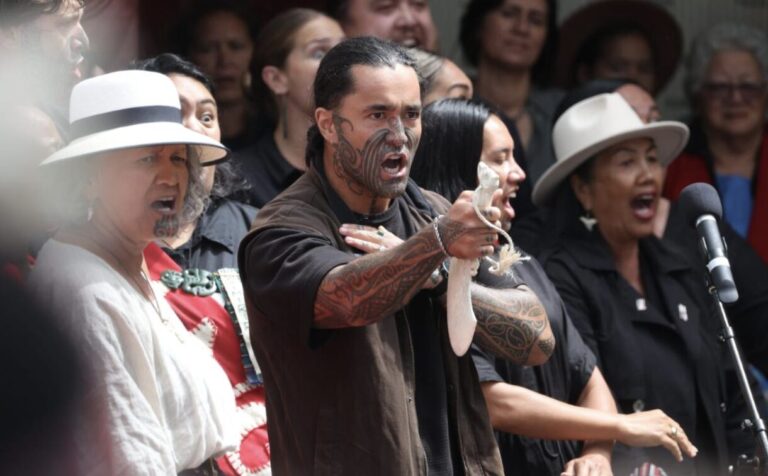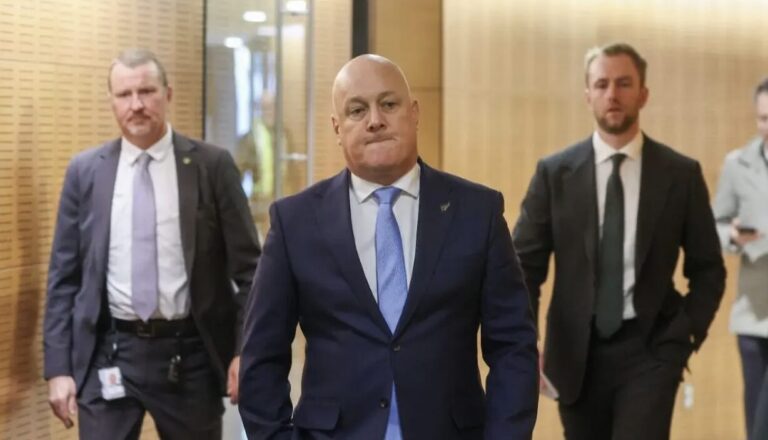GUEST BLOG: Nadine McDonnell – National party problems
“Practical men who believe themselves to be quite exempt from any intellectual influence, are usually the slaves of some defunct economist. Madmen in authority, who hear voices in the air, are distilling their frenzy from some academic scribbler of a few years back.”
The difficulty lies not so much in developing new ideas as in escaping from old ones.”
From John Maynard Keynes
Judith Collins and the National Party have a number of problems. But the big one is ideological. What does the National Party stand for? For the past thirty years the party has fallen ever deeper into the ideological grip of what many now call neo liberalism. Originally conceived as an alternative to the socialism and the welfare state, neo liberalism now refers to a general allegiance to a variety of generally right wing political ideas such as the social centrality of a economy built with private enterprise enjoying a freedom to trade (and make money) with limited government intervention, especially in regards to taxation and employment and environmental regulations. Neo liberalism is based on faith in the possibilities of a free and capitalist market. True believers genuinely truly believe that privately owned capitalist enterprise, not the state, will ensure social prosperity and security. Thus it made sense for believers to seek to organize all services, including public services such as health and education and welfare et al, as businesses motivated by profit, rather than around social objectives. The mantra was that efficient and effective government was best run as a business by a businessman. However, the 2020 election suggests that after thirty years, there are not many true believers anymore (excepting some members of the ACT).
In New Zealand the process of rolling back the state began with the second Labour government in the 1980s. Labour set the table and National sat down to eat. Throughout the 1990s public services were privatized and assets were sold. The government itself was restructured around cost centres and fixed term projects. The stated goal was to run the government as businesses. Citizens became clients. Regulation was red tape. Reducing state interference in the economy through deregulation and self-regulation was heralded as an engine of growth. The mantra was jobs, jobs, jobs. And if there weren’t any New Zealanders to do the work, vacancies were filled with immigrants and migrant workers regardless as to whether there was sufficient housing, education or health care to look after the new arrivals. Growing the economy for the sake of increasing national wealth was the objective. To some extent the experiment was successful. The population and the GNP increased. By the end of the Fifth National government in 2017, the ideology of neo liberalism was the way things were – most people accepted the role of businesses in the economy. The state and its government were seen as somehow incidental – inept, inefficient, and likely corrupt.
The problem, however, was that neo liberalism was never a coherent theory let alone programme for action. Over the years market fundamentalism became more fashion than ideology. Despite its incoherence and countless critiques, programmes from austerity to lower corporate taxes, free trade, deregulation of the labour market, re-organization of social services and so on, were implemented. The many failures of such programmes in either improving services or saving money seemed to have little effect on the political popularity of neo liberalism. Privatization was shown as often as not to transfer wealth from the public to the private sector without much improvement in the efficiency or effectiveness of the public service. As the saying goes, profit was privatized while loss was socialized. Self-regulation was revealed to be a form of deregulation. Over time though, the number of skeptics increased. The growing economic inequality and increasing poverty despite increasing national wealth worried a number of observers. Social problems no longer seemed to have a market solution. A free market approach did not seem likely to solve the housing crisis.
Events also conspired against the free market dream. The great crisis of 2008 strained faith in the neo liberal order. Governments around the world had to act to rescue the financial sector. In 2012 the Christchurch earthquake again forced the state to act. The people of New Zealand, not the shareholders of any corporation, were needed to fund the recovery. And the housing crisis just kept getting worse. The high cost low wage economy was no longer able to ensure that working people enjoyed a reasonable standard of living. In 2020 Covid happened. Once again the government had to step in and, surprisingly, did with good effect. The people of New Zealand saw the benefits of good government.
Over time a principal complaint of neo liberalism, that government was inherently bad, was laid bare. People can be well served by government. Good government is possible. Also the costs of relying on private enterprise became apparent. Businesses motivated by profit were more likely to serve the interests of the few, not the many. And so on. Of course, this does not mean that neo liberal suspicion of the public sector disappeared. Many people may not be willing to accept that ‘good government’ is expensive. In order to be well served, the public sector must be well funded. There must be good people, willing and able to serve the public. And these bureaucrats need to work in institutions capable of change. They must have enough capacity to meet ongoing and increasingly diverse public needs. Still in 2020 the spell neo liberalism held over the political class seemed to be weakening. A replacement, a different organizing ideology, remains unclear. But it will be Labour, not National, who will be best positioned to define a theory of governance through their policies.
So what now for the National Party. As opposition they will have to respond, with some kind of critique of the Labour programme. During the 2020 election campaign, their key criticism of Labour seemed to be that Labour had not done much and was incapable of doing better, whether in building houses or in enforcing the lockdown. The problem was that this critique was made against a backdrop of thirty years of telling people that government was, basically, a waste of time. It should have been no surprised that many voters believed that government is hopeless. So it was critical that National then explained what they would do differently. If Labour messed up because that is what governments do, how would National solve the problems, like housing. It was one thing to criticize Labour, but what would National have done? National’s response seemed to be that a National government would do a better job; National would be at running the government programmes than Labour. In 2020 even National Party candidates seemed reluctant to adopt the neo-liberal solution – let the market prevail. Market fundamentalism was no longer seen as credible. Voters looked at National, the party of small government now claiming to be ready for big government and voted for Labour. Arguably all but four seats in the country had a majority Labour party vote, not because a majority of New Zealanders now liked Labour or hated the Greens, but because they no longer believed that National had a better answer. It is possible that many voting for Labour even though they believed that Labour would likely screw up trying to run everything, but National would do worse by not trying.
Now the question for National is what to believe. Do they double down on the mantra of limited government open borders, as ACT is trying to do? Do they return to being the party of Muldoon with its big government and regulated industry? Or do they attempt a centre right version of the Third Way? There is a chance that if Labour does a reasonable job of governing, they replace the National Party as New Zealand’s ‘natural party’ of government.
It will be tough. National Party members will likely have difficulty accepting that their policies were based on ideology. The Party was a party of common sense not beholden to any “intellectual influence” etc. But without an ideological rethink it will be very hard for National to offer a coherent alternative to Labour. They could try their 2020 line of “we would do the same thing as Labour only better…” But unless Labour screws up, this will be a hard sell.
Nadine McDonnell. I arrived in New Zealand from Vancouver in the 1980’s. Legally trained, I have been an enduring student of politics – and philosophy. Over the years I have come to appreciate the importance of ideas – and the ability to talk about them.






A most possible scenario for National?
Most important political and socioeconomic parameters of the future will develop along the reality of attempted climate change adaptation measures. (In the TDB blog, the contributions from AFKTT very often do sketch out a baseline of features for this to happen which is unfortunately mostly ignored by others.)
So, what?
Assuming that there is no major natural disaster or other shock-like event over the next three years:
National will remain strongly anchored into neo-liberalism (and so will Labour).
As main strategy, National will try to further develop a high-tech based variation of natural resource exploitation and conservation under the umbrella of economic development. There are some in-build contradictions in such a concept, but those may have a chance to be juggled for another few years before final collapse.
If they are temporarily able to bring together the right ingredients and inputs, such strategy has good chances for acceptance in the eyes of the AONZ public.
Potential support partners for such game plan are already there, presently resting within Labour, but also in strategic positions of the other minor parties in parliament, including the Greens.
If National fails to ‘modernize’ in the context of globally evolving surveillance and security capitalism, Act will gain a reasonable opportunity, to take over the National mainstream.
All bets are probably off if there is continuity of major natural disasters or other shock-like events… that might become a good time for ‘strongman and gunslinger politics’.
Pretending resources are infinite and that the effects of pollution can be ignored -or mitigated with money created out of thin air- and religiously believing that Ponzi finance could be expanded forever always was a recipe for catastrophe. But that’s what we have endured, despite all the evidence to the contrary. So now we have catastrophe on all fronts. Multiple catastrophes on all fronts, in fact. Reaping what we sowed.
Far from recognising that resources are finite (and well past peak in many instances), and far from recognising that the effects of pollution are increasing dire in real terms and increasingly costly to cope with, and far from recognising that Ponzi finance is in the process of ‘blowing up’ -as all Ponzi schemes do- the behind-the-scenes nutcases who decide policy and the nutcases in parliament who implement policy persist with broken down theories that never had any scientific basis in the first place.
So Labour, National, ACT, the Greens, the Tories, UK Labour, the Republicans, the Democrats….are now all just noise on the road to self-annihilation via idiotic theories promoted by so-called economists.
I’m sure Kuznet must be rolling in his grave at the way his work [of the 1920s] got so misused.
Bernays, on the other hand, must be laughing himself silly in his grave, seeing his methods of manipulating the masses used so effectively to persuade them that black is white and that white is black, whilst they destroy themselves and their progeny through believing the bullshit churned out by the political-economic system.
The circus tent is on fire, most of the animals are dead, the acrobats and jugglers are too sick to perform, so who does the manager send in to keep the crowd entertained and distracted: the clowns, of course! Trump, Biden, Johnson, Turnbull, and here in NZ Key, Bridges, Muller, Collins, Brownlee, Twyford, Clark, Robertson, Shaw, Seymore etc. And dare I say it? Adern. She is such an adorable clown but nevertheless is a clown if she believes bullshit churned out by economists and central bankers. Which, apparently she does.
So the Reserve Bank of Australia has just dropped the base rate from 0.25% to 0.1%, and still nothing works. Aussie dollar went up instead of down. Woops!
I guess they have to try negative interest rates for a while before conceding defeat.
Oh Labour will screw up, they are the party of cluster fuck upperers and that is all we can count on from them. No change, same shit different day, more people living homeless, more poverty more kids going hungry. And then there’s climate change that is taking a back seat to Jacinda’s lets keep moving bull shit.
Whatever!
The point of the article is WHAT will National do better and HOW will they do it better?
Did you actually read the whole article?
Or just the last sentence?
I agree Verity. Tuibelle’s pro-National rant comes from a deep, myopic ideology within the psyche of an ‘intellectual’ (sic.) born-to-rule arrogance, backed up with dirty politics modus operandii and frothing hate speech.
When ACT, the architects of neoliberalism, first tried to get a foothold in NZ, their natural synergy partner with National was buggered by Rob Muldoon. They infiltrated 1984 Labour, but their natural ally was always National. National continued on selling off assets, long after Labour dropped neoliberalism like a nuclear albatross, with successions of leaders of ACT joining National and vice versa, ACT having cups of tea with National. ACT have attempted to join the middle ground by gumby dancing with the stars. ACT also seized the plight the gun lobbyists and of the dying, allowing people to be put out of their misery with six months to live.
The problem with ACT and their brand of neoliberalism is, that there is always a niggling feeling that they will solve the abhorrent-to-neoliberal problem of state-funded superannuation and make euthanasia compulsory, rather than voluntary. The gun lobbyists support will be cheaper than expensive assisted dying medication, thus saving the state via Pharmac and hard-earned GST tax revenue.
And with Winston gone, who will look after the “costly” elderly that aren’t coerced into, or nominated for, euthanasia?
I’m sure gerontophile Crusher Collins, will look after the elderly if she remains as leader.